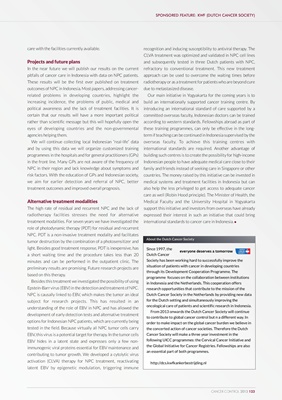
SPONSORED FEATURE: KWF (DUTCH CANCER SOCIETY)
care with the facilities currently available. recognition and inducing susceptibility to antiviral therapy. The
CLVA treatment was optimized and validated in NPC cell lines
Projects and future plans and subsequently tested in three Dutch patients with NPC,
In the near future we will publish our results on the current refractory to conventional treatment. This new treatment
pitfalls of cancer care in Indonesia with data on NPC patients. approach can be used to overcome the waiting times before
These results will be the first ever published on treatment radiotherapy or as a treatment for patients who are beyond cure
outcomes of NPC in Indonesia. Most papers, addressing cancer- due to metastasized disease.
related problems in developing countries, highlight the Our main initiative in Yogyakarta for the coming years is to
increasing incidence, the problems of public, medical and build an internationally supported cancer training centre. By
political awareness and the lack of treatment facilities. It is introducing an international standard of care supported by a
certain that our results will have a more important political committed overseas faculty, Indonesian doctors can be trained
rather than scientific message but this will hopefully open the according to western standards. Fellowships abroad as part of
eyes of developing countries and the non-governmental these training programmes, can only be effective in the long-
agencies helping them. term if teaching can be continued in Indonesia supervised by the
We will continue collecting local Indonesian “real-life” data overseas faculty. To achieve this training centres with
and by using this data we will organize customized training international standards are required. Another advantage of
programmes in the hospitals and for general practitioners (GPs) building such centres is to create the possibility for high-income
in the front line. Many GPs are not aware of the frequency of Indonesian people to have adequate medical care close to their
NPC in their region and lack knowledge about symptoms and family and friends instead of seeking care in Singapore or other
risk factors. With the education of GPs and Indonesian society, countries. The money raised by this initiative can be invested in
we aim for earlier detection and referral of NPC, better medical systems and treatment facilities in Indonesia but can
treatment outcomes and improved overall prognosis. also help the less privileged to get access to adequate cancer
care as well (Robin Hood principle). The Minister of Health, the
Alternative treatment modalities Medical Faculty and the University Hospital in Yogyakarta
The high rate of residual and recurrent NPC and the lack of support this initiative and investors from overseas have already
radiotherapy facilities stresses the need for alternative expressed their interest in such an initiative that could bring
treatment modalities. For seven years we have investigated the international standards to cancer care in Indonesia. l
role of photodynamic therapy (PDT) for residual and recurrent
NPC. PDT is a non-invasive treatment modality and facilitates
About the Dutch Cancer Society
tumor destruction by the combination of a photosensitizer and
light. Besides good treatment response, PDT is inexpensive, has Since 1997, the
a short waiting time and the procedure takes less than 20 Dutch Cancer
minutes and can be performed in the outpatient clinic. The Society has been working hard to successfully improve the
situation of patients with cancer in developing countries
preliminary results are promising. Future research projects are
through its Development Cooperation Programme. The
based on this therapy.
programme focuses on the collaboration between institutions
Besides this treatment we investigated the possibility of using in Indonesia and the Netherlands. This cooperation offers
Epstein-Barr virus (EBV) in the detection and treatment of NPC. research opportunities that contribute to the mission of the
NPC is causally linked to EBV, which makes the tumor an ideal Dutch Cancer Society in the Netherlands by providing new data
subject for research projects. This has resulted in an for the Dutch setting and simultaneously improving the
oncological care of patients and scientific research in Indonesia.
understanding of the role of EBV in NPC and has allowed the
From 2013 onwards the Dutch Cancer Society will continue
development of early detection tests and alternative treatment
to contribute to global cancer control but n a different way. In
options for Indonesian NPC patients, which are currently being order to make impact on the global cancer burden we believe in
tested in the field. Because virtually all NPC tumor cells carry the concerted action of cancer societies. Therefore the Dutch
EBV, this virus is a potential target for therapy. In the tumor cells Cancer Society will make a three year investment in the
EBV hides in a latent state and expresses only a few non- following UICC programmes: the Cervical Cancer Initiative and
the Global Initiative for Cancer Registries. Fellowships are also
immunogenic viral proteins essential for EBV maintenance and
an essential part of both programmes.
contributing to tumor growth. We developed a cytolytic virus
activation (CLVA) therapy for NPC treatment, reactivating http://dcs.kwfkankerbestrijding.nl
latent EBV by epigenetic modulation, triggering immune
CANCER CONTROL 2013 123